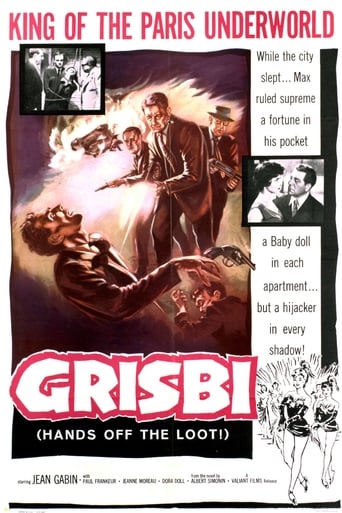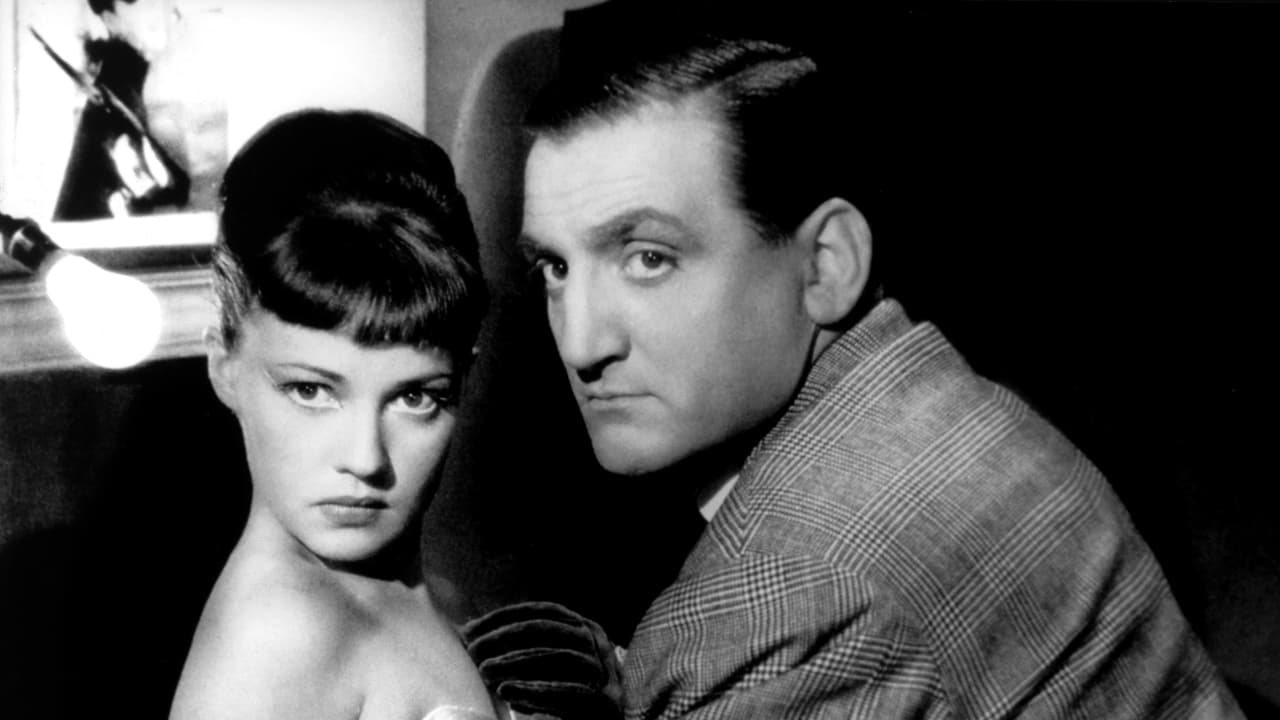sc8031
There's nothing exceptionally profound about the story to "Touchez pas au grisbi", one of Jacques Becker's later films -- but it sets up tons of film archetypes and patterns that later French Noir would emulate. Jean Gabin plays Max, an aging criminal set to retire with his friend, Ritan, when they're pushed into a state of paranoia by younger gangsters moving in on their retirement loot (their "grisbi").The film is not overtly flashy, but Max is one bad dude, expressed by the way he commands universal respect from his peers, patrons and the younger ladies who surround him. In fact, his musky appeal is hilarious in contrast with his romantically bumbling partner, as is the way he overtly womanizes (notice that none of the women in this film are wearing a bra!).There are only a handful of sets to the film, and a few outdoor scenes. The action happens suddenly and violently, which makes it much more jarring, and the themes of brotherly loyalty are expressed as both frustrating and endearing bonds, but with more nuanced definition than you might expect from such a straight-forward film. And to boot, there are some recognizable classic talents in this film, including Lino Ventura and Jeanne Moreau.While not explosive and over-the-top, the story, set-up and exposition of the gangster code are all the result of top-notch cinematic craftsmanship. The music is minimalist, the camera-work is easy on the eyes, and the characters are fun to watch. Half-goofily endearing and half-starkly serious, but mostly brilliant, Touchez pas au grisbi is a lot of fun.
writers_reign
It's a great pity that Marty Scorcese didn't catch this before embarking on a series of raw, brutal, in-yer-face gangster movies in which the likes of De Niro and Pesci rant like lunatics and call it acting. Here Jacques Becker delivers a gangster flick that is - wait for it - Subtle and Jean Gabin illustrates yet again that in screen acting less is more. Indeed Becker started something of a trend in French cinema with this entry for the very next year Jean-Pierre Melville weighed in with Bob, Le Flambeur, another underworld-setting film where violence is not of the scenery-chewing type. Were it not for the 'profession' of Max and Riton this could almost get under the wire as a comedy of manners or social commentary as Becker recreates lovingly and in great detail the milieu of the demi-monde in 50s Paris (like Bob, Le Flambeur, it begins with an Establishing Shot of Pigalle) and it's something of a master-stroke to begin the story AFTER Max and Riton have heisted a fortune in gold bars and stashed it away so that when we are introduced to them they could be part of a well-dressed group celebrating a family occasion - wedding, engagement, anniversary etc - rather than a seriously successful heist - even when Max reads about the score in a newspaper he gives no indication that he was the mastermind behind it. Of course conflict is called for and it arrives in the shape of Josie (Jeanne Moreau in an early role) the showgirl girlfriend of Riton who is tiring of him and prepared to switch her allegiance to Angelo (Lino Ventura in his impressive debut role), head of a rival gang, via putting him in the picture about the recent score. To cut to the chase Ventura's mob kidnap Riton and offer to trade him for the gold but in between Becker offers us a fascinating glimpse of a Parisian subculture where loyalty and friendship mean more than gold. As dbmonteuil said in another context on these boards (referring to Duvivier and Godard) I'd trade ALL of Marty Scorcese's crudeness for the elegance of this one.
palmiro
Like his masterpiece, 'Le trou', this film embodies Becker's distinctive vision of the world. We are given a portrait of a bond of love between two men--a kind of love which is beyond anything a man and a woman can know. But this is not Oscar Wilde's 'love which dare not speak its name': there is no hint of homoerotic sexuality. Rather, this is the bond of the trenches and the workplace (presumably class and underworld trenches in the case of the protagonists), a theme which has a tremendous atavistic resonance in French culture and history insofar as it reflects a collective male experience extending from the Napoleonic Wars through the Paris Commune down through WWI--the kind of camaraderie for life which predisposed a man to sacrifice all that he holds dear for another man (another instance of this is in Jean Vermillon's 'Gueule d'amour'), and hinted at in a sentimental, nuanced way when Max breaks out the foie gras and a bottle of blanc after his buddy has made a costly bonehead move. Note also that incredible sigh of utter lassitude that 'Max' (Jean Gabin) heaves as he sits through yet another girly show--or that look on his face as 'Betty' asks him if he loves her (after he's slept with her)--a look which tells us his every thought is on his pal, 'Riton'. This is not to say that women are portrayed throughout in a disparaging light: "Mme. Bouche", the owner of the restaurant and 'Marinette', the nightclub owner's wife (a wonderfully subtle portrait of uxorial solicitude and anxiety) are both characters who reinforce and serve male solidarity. But there's the suggestion that when the male/female bond involves sexuality, a guy can lose his head and forget about his mates.This male/female divide appears to overshadow class divisions, which were to be at the heart of Becker's 'Le trou.' Still we can see Becker's communist sympathies coming through in oblique ways. Max is the engaging, attractive character that he is because of his fierce devotion to others, his liberality of spirit (after he leaves a huge tip to the petit-bourgeois owner of the cafe' in the process of recycling leftover wine, the latter remarks, 'We could use more customers like him'), the value he places on his pal's life over the loot, the easy way he has with trusting and receiving the trust of others--all these things are non-commercial values and they suggest a world and way of life alternative to what America has in store for France. Note, for example, how the camera lingers on the road sign at the scene of the first shootout: 'Autoroute a' l'ouest', 'Expressway to the west'. It's the same road Max and his pals rush down and that takes them straight to the disaster with the loot. The promise of riches that America ('the West') tantalizingly dangled before the French in the form of the Marshall Plan was not to be taken up without heavy costs. Pauvre Max: in the end he cannot cry at the loss of his buddy (though I cried for him): he cannot express his grief because he is now in the company of "Betty", his American doll and source of support (fittingly played by a real-life Miss America of 1946).Sure made me feel as though I should have spent more of my life in France.
rdoyle29
The title of this French film noir is slang for "loot". Jean Gabin stars as racketeer Max. Seeking out the finer things in life, Max intends to pull one last job and retire. After stealing a fortune in gold, our hero is faced with a crisis of conscience when his best friend (Rene Dary) is kidnapped and held for a huge ransom, the proceeds of this last job. Max manages to turn the tables on the abductors, but his dreams of a life of ease explode in his face. Up-and-coming leading lady Jeanne Moreau plays a pivotal role as the femme fatale who leads Dary into the hands of his kidnappers.An intriguing film that inverts many of the film noir cliches. The heist which drives the film's plot has already occurred when the film starts, which has the effect of shifting the film's focus from the crime itself to the consequences of leading a life of crime. The characters are portrayed less like criminals than businessmen, calmly going about the business of earning a living. As a result, the few scenes of violence that occur are more shocking than they would be in a more routine crime film. An intriguing film that clearly influenced subsequent French crime films, especially Jules Dassin's "Rififi" and Jean-Pierre Melville's "Bob le Flambeur".


 AD
AD



